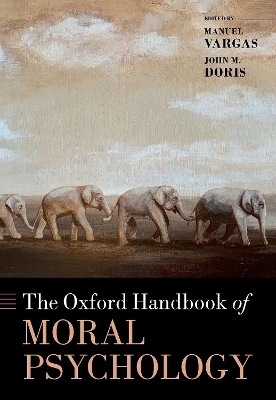
The Oxford Handbook of Moral Psychology
Oxford University Press (Verlag)
978-0-19-887171-2 (ISBN)
Moral psychology is the study of how human minds make and are made by human morality. This state-of-the-art volume covers contemporary philosophical and psychological work on moral psychology, as well as notable historical theories and figures in the field of moral psychology, such as Aristotle, Kant, Nietzsche, and the Buddha. The Oxford Handbook of Moral Psychology's fifty chapters, authored by leading figures in the field, cover foundational topics, such as character, virtue, emotion, moral responsibility, the neuroscience of morality, weakness of will, and the nature of moral judgments and reasons. The volume also canvases emerging work in applied moral psychology, including adaptive preferences, animals, mental illness, poverty, marriage, race, bias, and victim blaming. Collectively, the essays form the definitive survey of contemporary moral psychology.
John M. Doris is Peter L. Dyson Professor of Ethics in Organizations and Life at Cornell University. He has published widely in both scientific and philosophical journals, and been awarded fellowships from Michigan's Institute for the Humanities; Princeton's University Center for Human Values; the National Humanities Center; the American Council of Learned Societies; the Center for Advanced Study in the Behavioral Sciences; the National Endowment for the Humanities. He authored Lack of Character: Personality and Moral Behavior (Cambridge, 2002) and Talking to Our Selves: Reflection, Ignorance, and Agency (Oxford, 2015), and with his colleagues in the Moral Psychology Research Group wrote and edited The Moral Psychology Handbook (Oxford, 2010). Manuel Vargas is Professor of Philosophy at the University of California, San Diego. He is the author of Building Better Beings: A Theory of Moral Responsibility (OUP) and a co-author of Four Views on Free Will (Wiley-Blackwell). He writes about agency, ethics, and the history of Latin American philosophy.
Introduction
I. History
1: Bronwyn Finnigan: Karma, Moral Responsibility, and Buddhist Ethics
2: Rachana Kamtekar: Plato: Moral Psychology
3: Agnes Callard: The Virtuous Spiral: Aristotle's Theory of Habituation
4: Terence Irwin: Reason as Servant of the Will: Some Critics of Aquinas
5: Rachel Cohon: Moral Sentiments in Hume and Adam Smith
6: Lucy Allais: From a priori respect to human frailty: optimism and pessimism in Kant's moral psychology
7: Brian Leiter: Nietzsche's Naturalistic Moral Psychology: Anti-Realism, Sentimentalism, Hard Incompatibilism
II. Foundations
8: Samuel Asarnow and David Taylor: Judgment Internalism
9: Lorraine Besser: Virtue
10: David Brink and Dana Kay Nelkin: The Nature and Significance of Blame
11: Fiery Cushman, Arunima Sarin, and Mark Ho: Punishment as Communication
12: Stephen Darwall: The Moral Psychology of Respect
13: Justin D'Arms: Emotion Kinds, Motivation and Irrational Explanation
14: Julia Driver: Moral Expertise
15: Joshua Greene, Karen Huang, and Max Bazerman: Redirecting Rawlsian Reasoning Toward the Greater Good
16: Richard Holton: Self-Deception and the Moral Self
17: Dan Kelly: Two Ways to Adopt a Norm: The (Moral?) Psychology of Internalization and Avowal
18: Joshua Knobe: Morality and Possibility
19: Ron Mallon: Social Construction, Revelation, and Moral Psychology
20: Al Mele: Weakness of Will
21: John Mikhail: Moral Nativism
22: Susana Monso and Kristin Andrews: Animal Moral Psychologies
23: Shaun Nichols: Moral Learning and Moral Representations
24: Cailin O'Connor: Methods, Models, and the Evolution of Moral Psychology
25: Lauren Olin: The Moral Psychology of Humor
26: Adina Roskies: The Limits of Neuroscience for Ethics
27: Fernando Rudy: The Moral Psychology of Moral Responsibility
28: David Shoemaker and Kevin Tobia: Personal Identity
29: Walter Sinnott-Armstrong and Daryl Cameron: Some Potential Philosophical Lessons of Implicit Moral Attitudes
30: Michael Smith: The Nature of Reasons for Action and their Psychological Implications
31: Valerie Tiberius & Dan Haybron: Prudential Psychology: Theory, Method, and Measurement
32: Maria Waggoner, John Doris, and Manuel Vargas: Situationism, Moral Improvement, and Moral Responsibility
III. Applications
33: Santiago Amaya: Negligence: its Moral Significance
34: Berit Brogaard: Sex By Deception
35: Mich Ciurria: The moral psychology of blame: A feminist analysis
36: Fiery Cushman and L. A. Paul: Are Desires Interdependent
37: Carly Giffin and Tania Lombrozo: Mens Rea in Moral Judgment and Criminal Law
38: Jesse Graham and Daniel A. Yudkin: Variations in Moral Concerns Across Political Ideology: Moral Foundations, Hidden Tribes, and Righteous Division
39: Serene Khader: Adapative Preferences and the Moral Psychology of Oppression
40: Stephen Macedo: Marriage, Monogamy, and Moral Psychology
41: Heidi Maibom: Empathy and Moral Understanding in Psychopathy
42: Emily McTernan: Moral Character, Liberal States, and Civic Education
43: Jennifer Morton: A Moral Psychology of Poverty?
44: Dominic Murphy and Natalia Washington: Agency in Mental Illness and Disability
45: Laura Niemi and Liane Young: The Moral Psychology of Victimization
46: Kathryn J. Norlock: Forgiveness and Moral Repair
47: Gideon Rosen: Accountability and Implicit Bias: A Study in Skepticism about Responsibility
48: Chandra Sripada: Loss of Control in Addiction: The Search for an Adequate Theory and the Case for Intellectual Humility
49: Monique Wonderly: Love and the Anatomy of Needing Another
50: Robin Zheng: Race and Moral Psychology
| Erscheinungsdatum | 06.07.2022 |
|---|---|
| Reihe/Serie | Oxford Handbooks |
| Verlagsort | Oxford |
| Sprache | englisch |
| Maße | 180 x 252 mm |
| Gewicht | 2072 g |
| Themenwelt | Geisteswissenschaften ► Philosophie ► Ethik |
| Geisteswissenschaften ► Psychologie | |
| ISBN-10 | 0-19-887171-6 / 0198871716 |
| ISBN-13 | 978-0-19-887171-2 / 9780198871712 |
| Zustand | Neuware |
| Informationen gemäß Produktsicherheitsverordnung (GPSR) | |
| Haben Sie eine Frage zum Produkt? |
aus dem Bereich


